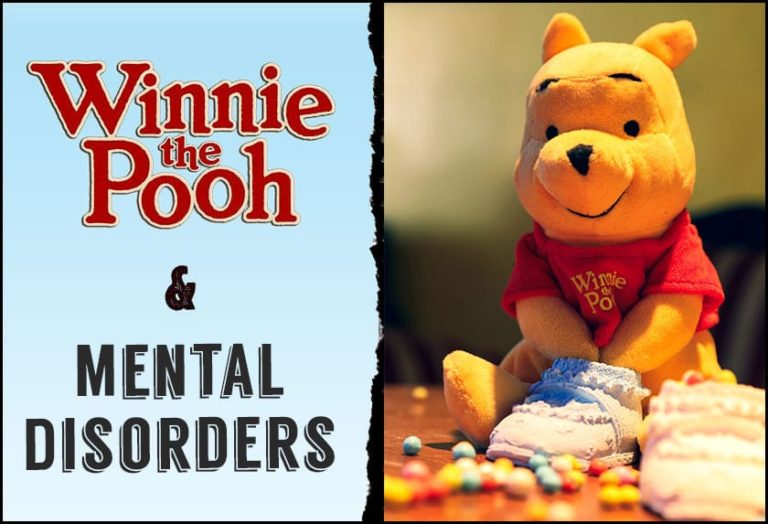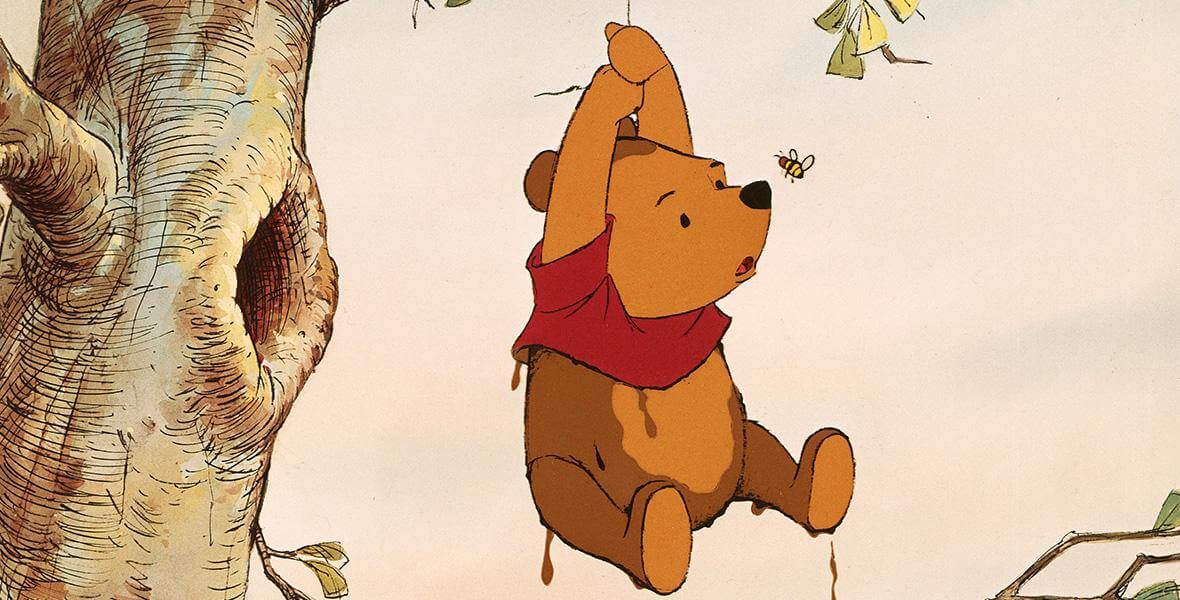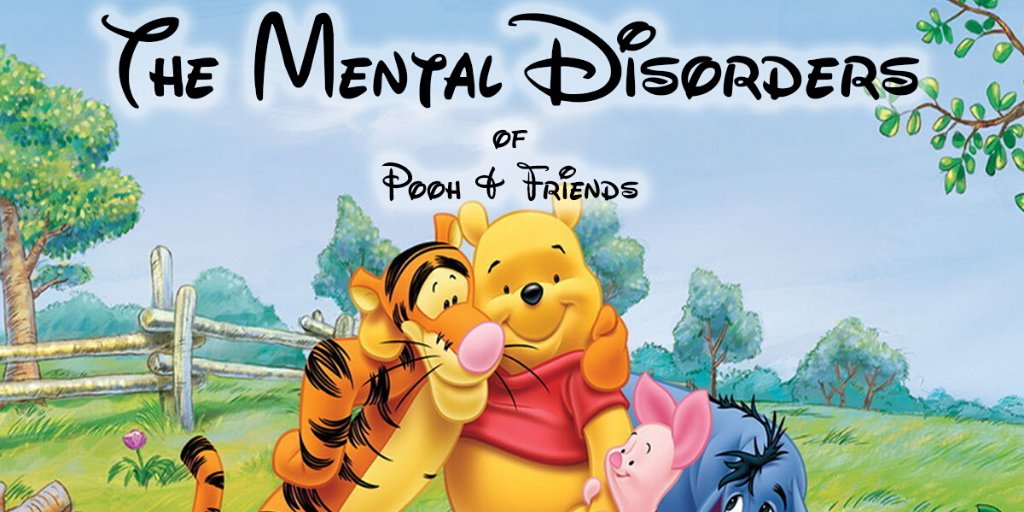Winnie The Pooh Characters & Mental Disorders: A Deep Dive
Have you ever looked at the denizens of the Hundred Acre Wood and wondered if their charming quirks might be more than just character traits? The whimsical world of Winnie the Pooh, a children's classic, harbors a fascinating and often overlooked layer: a potential exploration of mental health through its beloved characters.
The notion that the inhabitants of the Hundred Acre Wood, from the honey-loving Pooh to the perpetually gloomy Eeyore, might represent different facets of mental health has sparked considerable debate since researchers brought the theory forward nearly 70 years after the stories first captured hearts. While the author, A.A. Milne, may not have explicitly intended to create an allegorical representation of psychological conditions, the behaviors exhibited by his creations resonate with patterns observed in the real world of mental health challenges. This perspective offers a fresh lens through which to view the stories, inviting reflection on themes of compassion, understanding, and the challenges of navigating life's ups and downs.
| Character | Possible Mental Health Condition | Observed Behaviors |
|---|---|---|
| Winnie the Pooh | ADHD (Inattentive Type), Eating Disorder, OCD | Inattentiveness, disordered thoughts, frequent forgetfulness, fixation on routines (honey), repeated behaviors. |
| Piglet | Generalized Anxiety Disorder | Constant worry, timidity, lack of self-confidence. |
| Eeyore | Depressive Disorder, Dysthymia | Pessimism, low energy, sadness, negative self-perception. |
| Tigger | ADHD (Hyperactive-Impulsive Type) | Hyperactivity, impulsivity, difficulty concentrating, excitability. |
| Rabbit | Obsessive-Compulsive Disorder (OCD) | Need for order, perfectionism, planning, control, and anxiety when routines are disrupted. |
| Owl | Dyslexia | Difficulty with reading and writing, although not explicitly named, could reflect it |
| Christopher Robin | Childhood with possible anxiety, potential for being a caretaker | High levels of responsibility for others, potential for feelings of unease, can be viewed as the "normal" character. |
Reference: Pathology in the Hundred Acre Wood: A Neurodevelopmental Perspective on A. A. Milne
Let's begin, shall we, with the perpetually honey-obsessed Winnie the Pooh. While this innocent teddy bear is a symbol of childhood joy, a closer look reveals a complex array of behaviors that align with potential mental health struggles. Pooh's often-disordered thoughts, his inattentiveness, and his tendency to forget things, are all signs of attention deficit hyperactivity disorder, or ADHD, specifically the inattentive subtype. His relentless focus on honey and his routines also points to possible obsessive-compulsive disorder (OCD) and an eating disorder.
Piglet, the ever-anxious friend, displays the hallmark signs of generalized anxiety disorder. His constant worry, timidity, and lack of self-confidence make him a clear representation of the internal battles anxiety can wage. Eeyore, with his gloomy outlook and consistently pessimistic perspective, embodies the experience of depressive disorder, or potentially dysthymia, a chronic, low-grade form of depression. Eeyore's low energy, sadness, and negative self-perception are all consistent with this condition.
Tigger, the exuberant and energetic tiger, bounces through life, exhibiting behaviors that are often associated with ADHD, specifically the hyperactive-impulsive type. His hyperactivity, impulsivity, and difficulty concentrating are easily observed. Rabbit, always meticulous and focused on order, appears to display characteristics of obsessive-compulsive disorder (OCD). His need for order, his planning, and his anxiety when routines are disrupted, highlight the internal struggles that can come with this condition.
Owl, the self-proclaimed intellectual of the group, struggles with reading and writing, which could be indicative of dyslexia, a learning disorder. Finally, Christopher Robin, the human companion in this world, often takes on the role of caretaker, displaying behaviors that might be associated with anxiety, as he deals with friends having disorders.
This perspective, put forward in the early 2000s by researchers, challenges us to consider the Hundred Acre Wood as more than a collection of whimsical tales. It prompts us to recognize the universality of mental health challenges, even within the context of a children's story. It also gives a new perspective on the importance of compassion, understanding, and the need to approach each other with kindness. Could Pooh's calm distraction, Rabbit's mania, or Eeyore's gloomy outlook teach children about mental illness?
The publication of this theory provoked a heated debate, with many finding the comparison of children's characters to mental health disorders to be a step too far. However, it has also opened up a dialogue about mental health, making it more accessible for conversation. Regardless of how Milne intended the characters to be perceived, the Hundred Acre Wood serves as a gentle reminder of the importance of compassion, understanding, and friendship.
When we consider these classic characters as more than what we originally thought, we find them to be a powerful example of the value of mental health discourse and acceptance. They provide a relatable and accessible avenue for exploring the complexities of human behavior. This offers an opportunity to connect with children and adults alike about emotional wellbeing. In the end, the stories of Winnie the Pooh and his friends offer a unique opportunity to understand the varied facets of mental health.
In the end, this theory has influenced conversations about mental health and encouraged us to talk with friends and loved ones about their experiences. And, as we journey through life, we learn the importance of supporting each other through both good times and bad.


